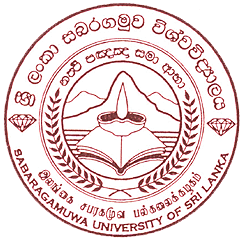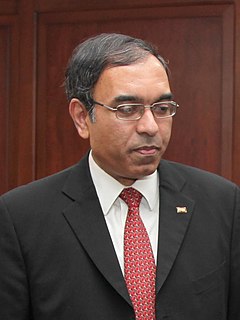Related Research Articles

The Colombo Plan is a regional intergovernmental organization that began operations on 1 July 1951. The organization was conceived at an international conference, The Commonwealth Conference on Foreign Affairs held in Colombo, Ceylon in January 1950, and was attended by the finance ministers of Australia, the United Kingdom, Canada, Ceylon, Pakistan and New Zealand, and the prime ministers of Ceylon and India. Membership has expanded significantly over the years to the current 28 governments.

The South Asian Association for Regional Cooperation (SAARC) is the regional intergovernmental organization and geopolitical union of states in South Asia. Its member states are Afghanistan, Bangladesh, Bhutan, India, Maldives, Nepal, Pakistan, and Sri Lanka. SAARC comprises 3% of the world's land area, 21% of the world's population and 5.21% of the global economy, as of 2021.

"The Open University of Sri Lanka" is a national university in Sri Lanka. It is unique within the Sri Lankan national university system for being the only university to offer programs of study leading to certificate, diploma, degrees and postgraduate degrees up to PhD level through the Open and Distance Mode of Learning (ODL). The degrees awarded by the university are treated as equivalent to degrees awarded by any other Sri Lankan University under the preview of the University Grants Commission.

Open University Malaysia, abbreviated as OUM, is the 7th Malaysian private university and it is owned by the Multimedia Technology Enhancement Operations (METEOR) Sdn. Bhd, a consortium of 11 Malaysian public universities. It leverages on the quality, prestige and capabilities of its consortium.

The South Asian Free Trade Area (SAFTA) is a 2004 agreement that created a free-trade area of 1.6 billion people in Afghanistan, Bangladesh, Bhutan, India, the Maldives, Nepal, Pakistan and Sri Lanka with the vision of increasing economic cooperation and integration.
The University of Colombo is a public research university located primarily in Colombo, Sri Lanka. It is the oldest institution of modern higher education in Sri Lanka. Specialised in the fields of natural, social, and applied sciences as well as mathematics, computer sciences, and law. It is ranked among the top 10 universities in South Asia.

The University of Moratuwa is a public university in Sri Lanka. It is located on the bank of the Bolgoda Lake in Katubedda, Moratuwa. Apart from academics including undergraduate and postgraduate studies, the University of Moratuwa presents social and cultural activities, student services, societies, and sports and recreational activities. The institution was known as Ceylon College of Technology, Katubedda before gaining university status. Its roots go back to the Institute of Practical Technology founded in 1960 to provide technical education.

Netaji Subhas Open University (NSOU) is a state open university imparting distance education in eastern India.

The Bay of Bengal Initiative for Multi-Sectoral Technical and Economic Cooperation (BIMSTEC) is an international organisation of seven South Asian and Southeast Asian nations, housing 1.73 billion people and having a combined gross domestic product of US$4.4 trillion (2022). The BIMSTEC member states – Bangladesh, Bhutan, India, Myanmar, Nepal, Sri Lanka, and Thailand – are among the countries dependent on the Bay of Bengal.

The University of Peradeniya is a public university in Sri Lanka, funded by the University Grants Commission. It is the largest university in Sri Lanka, which was originally established as the University of Ceylon in 1942. The university was officially opened on 20 April 1954, in the presence of Queen Elizabeth II, by Prince Philip, Duke of Edinburgh.

The Bangladesh Open University or BOU is a public university with its main campus in Board Bazar, Gazipur District, Dhaka Division. It is the 7th largest university in the world according to enrolment.

Indira Gandhi National Open University, known as IGNOU, is a Central University located at Maidan Garhi, New Delhi, India. Named after former Prime Minister of India Indira Gandhi, the university was established in 1985 with a budget of ₹20 million, after the Parliament of India passed the Indira Gandhi National Open University Act, 1985. IGNOU is run by the central government of India, and with total active enrollment of over 4 million students, it is the largest university in the world.

The Sabaragamuwa University of Sri Lanka is a public university in Belihuloya, Balangoda, Sri Lanka. It was founded on 20 November 1991 and consists of Eight faculties.

South Asian University (SAU) is an international university sponsored by the eight Member States of the South Asian Association for Regional Cooperation (SAARC). The eight countries are: Afghanistan, Bangladesh, Bhutan, India, Maldives, Nepal, Pakistan and Sri Lanka. The university started admitting students in 2010, at a temporary campus at Akbar Bhawan, India. Its permanent campus will be at Maidan Garhi in South Delhi, India, next to Indira Gandhi National Open University (IGNOU).

Asia e University (AeU) is an international university in Subang Jaya, Malaysia that offers on-campus, blended and online learning mode programmes. An institution set in Asia, by Asians, and for Asia – founded by the Asia Cooperation Dialogue foreign ministers. Asia Cooperation Dialogue is represented by the foreign ministers of 34 Asia Pacific countries, and it aims to promote cooperation in areas like education, through projects such as Asia e University at the Islamabad 2005 and Doha 2006 Asia Cooperation Dialogue ministerial meetings.

Secretary-General of the South Asian Association for Regional Cooperation, is head of a SAARC Secretariat, which is headquartered in Kathmandu, Nepal. SAARC is an economic and geopolitical union between the eight South Asian member nations, Afghanistan, Bangladesh, Bhutan, India, Maldives, Nepal, Pakistan and Sri Lanka. Secretary-General is appointed for a three-year term by election by a council of Ministers from member states. Secretary-General is assisted by eight deputies, one from each nation, who also reside in Kathmandu. SAARC Secretariat was established in Kathmandu on 16 January 1987 by Bangladeshi diplomat Abul Ahsan, who was its first Secretary-General, and was inaugurated by King Birendra Bir Bikram Shah of Nepal. Since its creation, its member nations have contributed to a total of fourteenth General Secretaries. Sri Lanka's diplomat Esala Weerakoon is the current Secretary-General, having assumed charge on 1 March 2020.

South Asia Foundation (SAF) was founded by UNESCO Goodwill Ambassador Madanjeet Singh in 2000. The South Asia Foundation (SAF) is a secular, non-profit and non-political organization, comprising eight autonomous chapters: Afghanistan, Bangladesh, Bhutan, India, Maldives, Nepal, Pakistan and Sri Lanka.
SAARC Chamber of Commerce and Industry, recognized as a regional apex trade body by South Asian Association for Regional Cooperation is a constellation of the eight national Federation Chambers of Commerce and Industry of the member states of SAARC. The rationale behind the creation of SAARC Chamber of Commerce and Industry of the SAARC countries was to promote trade and industry in the region and to develop and achieve common objectives in the areas of trade and industry, moreover, the SAARC Chamber of Commerce and Industry is also accepted as the voice of the private sector across the region.

Abas Basir is an Afghan academic and politician who served as the Minister of Higher Education from 14 September 2020 to 15 August 2021. He also held various significant national and international posts. He has served as Director General of South Asia Co-operative Environment Programme (SACEP) who was nominated by the Government of Islamic Republic of Afghanistan for a term of three years, from August 2018 to September 2020. Dr. Abas Basir was also appointed as Deputy for South Asia Neutregeon Hub between the years 2019–2020.
References
- ↑ SAARC: The Declaration of the Tenth SAARC Summit (URL last accessed on April 29, 2007)
- ↑ South-Asia.com: Vice-Chancellors of Open Universities Gather in Colombo Archived 2007-03-05 at the Wayback Machine , SAARC News, February 1999 (URL last accessed on April 30, 2007)
- ↑ South-Asia.com: SAARC Launches Co-operation in Open Learning and Distance Education in the Region, SAARC News, January 2000 (URL last accessed on April 30, 2007)
- ↑ SAARC Website: SAARC Consortium on Open and Distance Learning (URL last accessed on April 30, 2007